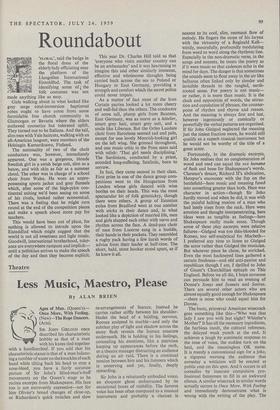Roundabout
'FLORAL', said the badge in the floral dress of the elderly lady officiating near the platform of the Llangollen International Eisteddfod. The task of identifying some of ; the Girls walking about in what looked like grey serge total-immersion baptismal robes ought to have come from some formidable free church community in Glamorgan or Bavaria where the elders outlawed cosmetics but tolerated uplift. They turned out to be Italians. And the tall, slim men with Yale haircuts, walking with an all-American languor, were members of the Helsingin Kamarikuoro, Finland.
The nationality of two of the choir conductors was, however, immediately apparent. One was a gorgeous, blonde Swedish girl in a swish beige suit, slim as a baton, and with skin as fair as a summer cloud. The other was in charge of a school choir from Wales. He wore an unpre- possessing sports jacket and grey flannels which, after some of the high-price con- tinental suiting we'd been seeing on some of his rivals, looked rather economical. There was a feeling that he might turn round at the end of the competition pieces and make a speech about more pay for teachers.
This would have been out of place, for nothing is allowed to intrude upon the Eisteddfod which might suggest that the world is not all sweetness and light music. Goodwill, international brotherhood, toler- ance are everywhere rampant and implicit— until a politician arrives to make the speech of the day and then they become explicit. This year Dr. Charles Hill told us that 'everyone who visits another country can be an ambassador' and it was heartening to imagine this and other similarly immense, effective and wholesome thoughts being carried back across the sea to Poland or Hungary or East Germany, providing a strength and comfort which the secret police could never impair.
As a matter of fact most of the Iron Curtain parties looked a lot more cheery and well-fed than the others. The conductor of some tall, plump girls from Bautzen, East Germany, was as suave as a hotelier, smart grey hair, smart grey suit, and a smile like Liberace. But the Orfeo Laudate choir from Barcelona seemed sad and pale, except for one lovely Moorish-looking girl on the left wing. She grinned throughout, and one music critic in the Press seats said with relish: 'That girl needs disciplining.' The Sardinians, conducted by a priest, sounded long-suffering, fatalistic, born to sorrow.
In fact, they came second in their class. First prize in one of the dance group com- petitions went to the Hungarians from London whose girls danced with wine bottles on their heads. This was the most spectacular bit of folk gimmickry, though there were others. A group of Estonian exiles from Bradford went at one another with sticks in their dance and, in what looked like a depiction of married life, men and girls slapped each other with verve and rhythm across the face. A dead-pan choir of men from Lucerne sang in a huddle, their hands in their pockets. They resembled a rugby pack having a few harsh words of advice from their leader at half-time. The short, bald, stout hooker stood apart, as if he knew it all.






































 Previous page
Previous page